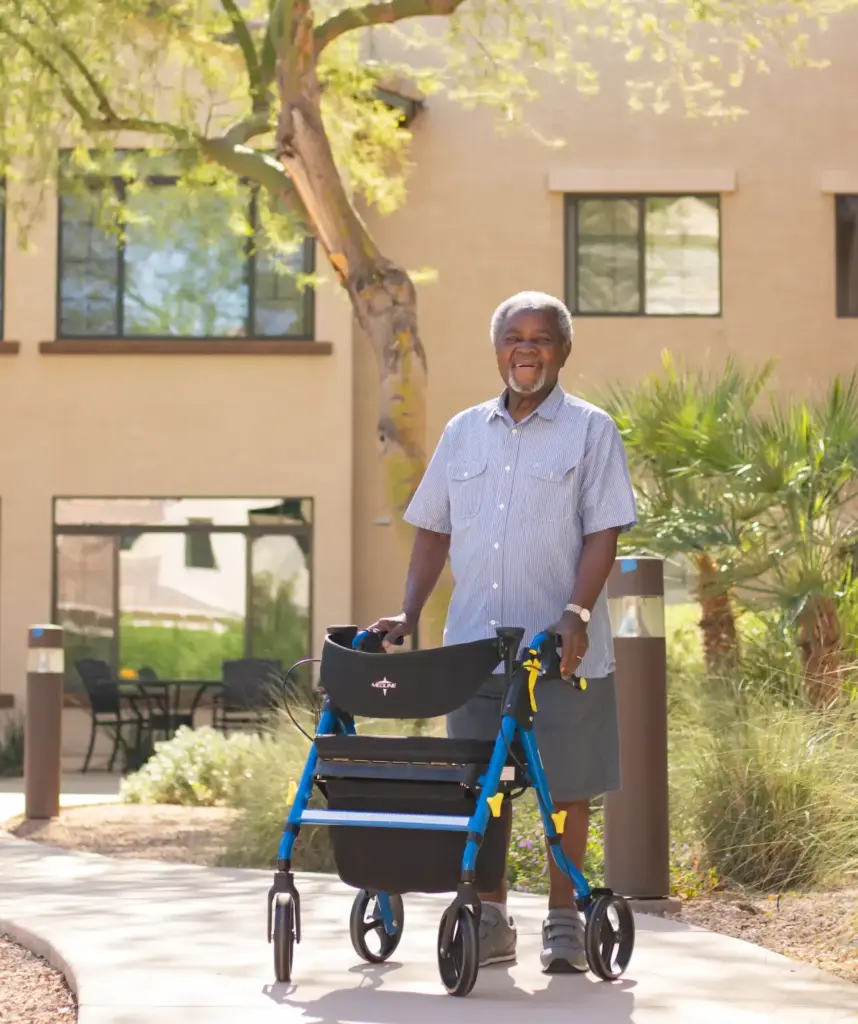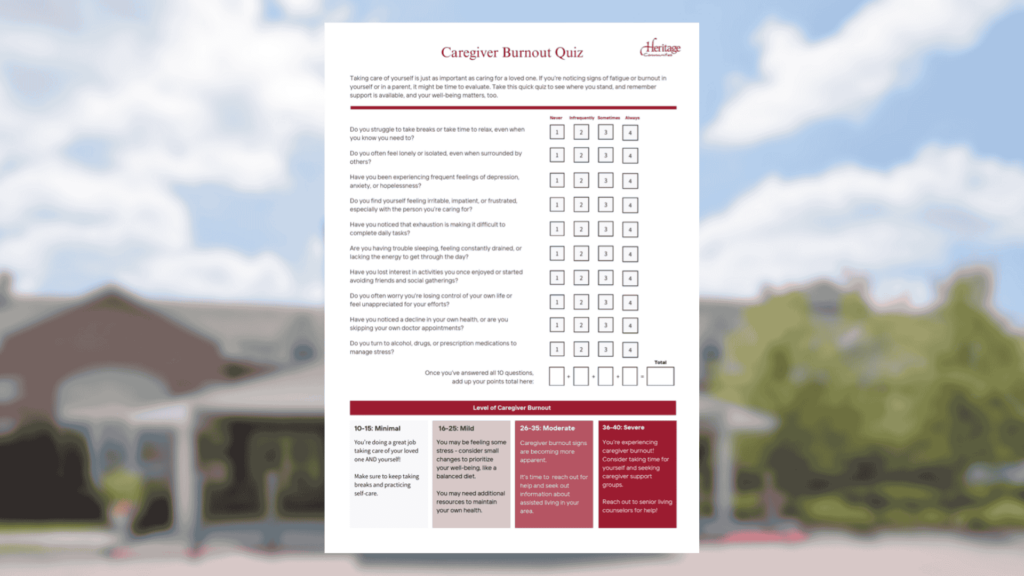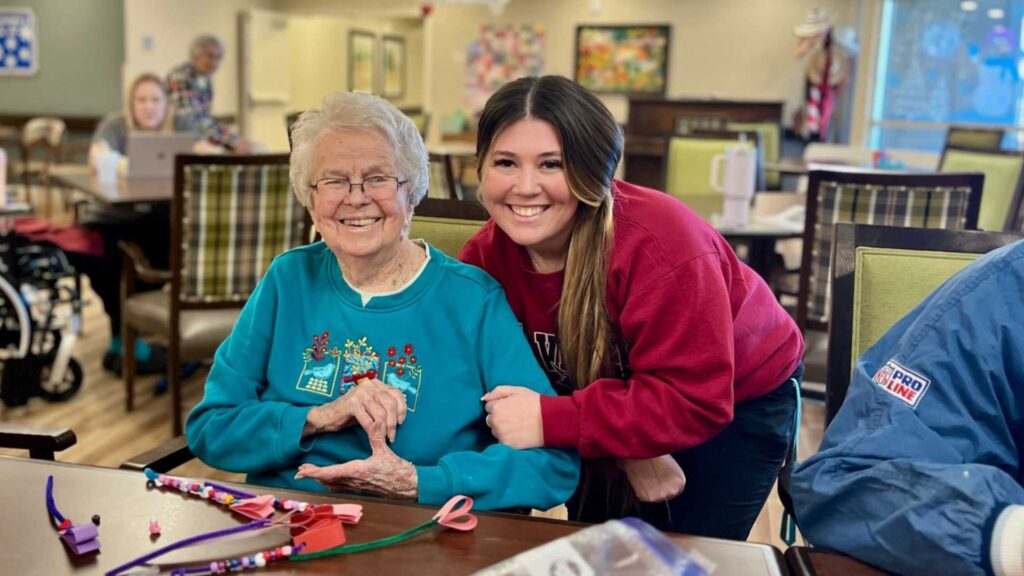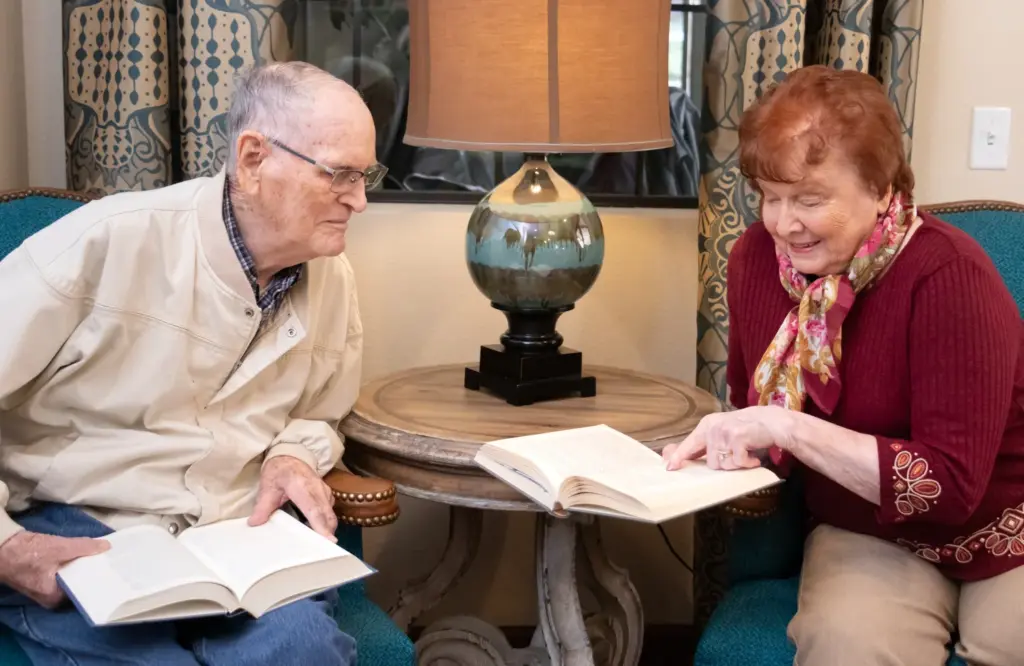Feeling Guilty as a Caregiver: Strategies and Support
Dealing with the heavy circumstances of caring for an aging loved one can take a tremendous emotional and physical strain on a person. One of the most common emotions someone can feel is caregiver guilt. Although the pressure can seem overwhelming, you aren’t alone.

There are many strategies and support resources to help you handle guilt and maintain a better sense of well-being. At Heritage Communities, we understand the complexities of this role and are here to help you not only manage caregiver guilt but also explore supportive living options that can ease your burden.
Why Do Caregivers Feel Guilty?
Whether you’re caring for a loved one with dementia, Alzheimer’s disease, or other age-related conditions, it’s normal to feel overwhelmed by the emotional weight of caregiving. According to Ohio State University, a caregiver can feel guilt for a variety of reasons, mainly leading back to the massive pressure to “do it all.” Among the most common reasons why guilt comes about include the following:
- Limited time to nurture other relationships and focus on career goals
- Self-blame regarding your loved one’s health condition
- Frustration over the loss of personal time
- Concerns about not having enough patience
- Challenges in managing your loved one’s symptoms
- Uncertainty about making the correct caregiving decisions
- Concerns about caregiver burnout and its impact on your daily life
Strategies for Dealing With Guilt
Though the pressure of caregiving can be intense, it’s important to manage these emotions for your own well-being and to provide the best care for your loved one. At Heritage Communities, we understand the weight of this responsibility. That’s why we’ve offered some thoughtful strategies to help you cope with the emotional challenges of caregiving, ensuring you remain healthy and supported throughout your journey.
1. Acknowledge the Guilt
It’s common to feel like you’re constantly juggling and still dropping the ball. Maybe you missed your son’s soccer game because you were at a doctor’s appointment with your mom, or you feel torn by the demands of your job and your dad’s increasing needs. These situations can stir up guilt, a companion many of us wish we didn’t have. As you try to process being a caregiver, try to identify the guilt and explore where it might stem from. By recognizing the source of your guilt, you can better cope with and manage it.
2. Avoiding Comparisons
Every caregiving journey is as unique as the people involved. Focus on what your loved one needs and what you can provide without comparing yourself to others. Recognize that every single caregiver might try and seem perfect on the outside but have their own struggles and anxieties.
3. Focus on the Positive
Did you manage to make your parent smile today? That’s a win. Hold onto these moments rather than the ones that didn’t go as planned. It’s these small wins that build the bridge over guilt. Concentrating on what can go wrong can be relatively easy, especially as a caregiver. Instead, focus on the little things and positive interactions.
4. Seek Social Support
When you feel burned out or tired from caregiving responsibilities, recognize that you do not have to do this alone. Not only are there people in your life you can count on for support, but you can also seek support groups to connect with those who understand the physical and emotional challenges of being a caregiver. Joining a support group at Heritage Communities can connect you with others who truly get it. It’s not just about venting—it’s about finding real solutions and making meaningful connections.
5. Find Balance
While caregiving is a great responsibility that will take up a good portion of your time, it should not be your entire identity. Keep up with hobbies and friendships, as they’re your lifelines to normalcy and joy. Let’s find ways to weave your interests into your caregiving routine. After all, the guilt will only maximize if you make caregiving your entire life.
6. Talk With a Therapist
Sometimes, a good chat with someone who understands can make all the difference. Whether it’s a therapist, a fellow caregiver, or an associate at Heritage Communities, talking can help you navigate through tough emotions and recharge. If your guilt persists and continues to interfere with your life and responsibilities, therapy is especially a great resource to turn to. By working through vulnerable emotions and breaking down difficult situations with a therapist, you can better reframe your thoughts and beliefs and better handle your tasks as a caregiver.
Support Resources For Caregivers – Respite Care and More
On top of the strategies you can use to best deal with caregiver guilt, there are outside resources you and your family can use to give your loved one the best support they need. After all, everyone needs a helping hand. Some of the most valuable resources and practices to consider include the following:
- Seek respite care to give yourself a much-needed break
- Joining a support group at a Heritage Community
- Keep communication strong and
- Deepen your understanding of your loved one’s condition
However, there will most likely come a time when you’ll need to find an alternate solution outside of your own care. This is perfectly all right and does not reflect your job as a caregiver in any way. Heritage Communities is here to serve not just as a provider when it is time for assisted living but as a trusted resource in your planning process. Our extensive connections to various aging support solutions in the regions where our communities are located equip us to guide you toward the resources you need.
Find the Right Support and Care With Heritage Communities
Remember, at Heritage Communities, we’re not just a senior living community; we’re a team that cares about you and your family’s journey. If you’re feeling the weight of caregiving, let’s talk about how we can help. We invite you to call a community or contact us online to explore the support options available or just to talk about what you’re going through.
When you’re ready to seek additional support, allow Heritage Communities to provide you and your family with the assistance you deserve. Across several states, our diverse senior living communities offer a range of living options and accommodations. We’re committed to matching your loved one with the lifestyle and care that not only meets their needs but also enhances their well-being.






